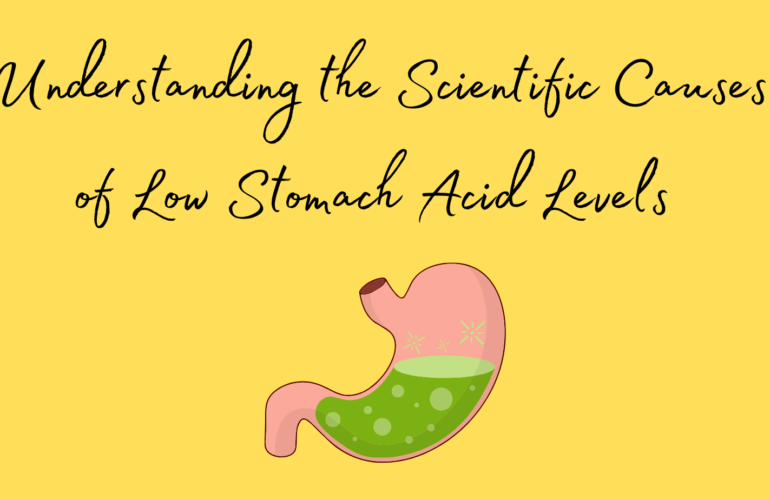Hydrochloric acid, also known as stomach acid, plays a crucial role in the digestion process. It aids in breaking down food particles, facilitating nutrient absorption, and preventing harmful bacteria from entering the gastrointestinal tract. However, sometimes the body may produce inadequate levels of hydrochloric acid, leading to a condition known as hypochlorhydria or low stomach acid. In this article, we will delve into the scientific explanations behind the various factors that can cause low stomach acid levels.
Stress: Psychological, Emotional, & Environmental Stress

Stress can have a profound impact on the body’s physiology, including digestive functions. When the body is under stress, the production of hydrochloric acid may be inhibited. Stress activates the sympathetic nervous system, commonly referred to as the “fight or flight” response, which diverts the body’s resources away from non-essential functions, including digestion. Chronic stress can lead to long-term low stomach acid levels, affecting overall digestion and nutrient absorption.
Toxic Substances

Exposure to toxic substances, such as heavy metals, pesticides, and certain chemicals, can harm the cells in the stomach lining responsible for producing hydrochloric acid. Chronic exposure to these toxins can impair the production and release of stomach acid, leading to digestive issues and low stomach acid levels.
Lack of Sleep

Sleep plays a vital role in maintaining overall health, including digestive function. Poor or inadequate sleep can disrupt the body’s normal functioning, affecting hormone regulation and increasing stress levels. As mentioned earlier, stress can hinder the production of hydrochloric acid, potentially leading to low stomach acid levels.
Old Age

As individuals age, certain physiological changes occur in the body, including a decrease in the production of stomach acid. The cells responsible for secreting hydrochloric acid may become less efficient over time, resulting in reduced stomach acid levels in older individuals. This decline in stomach acid production can contribute to digestive issues and nutrient deficiencies in the elderly.
Stomach Surgery

Certain surgical procedures, such as gastric bypass surgery, can alter the structure of the stomach, affecting its ability to produce adequate amounts of hydrochloric acid. This surgical intervention can lead to a condition known as achlorhydria, where the stomach produces little to no acid, severely impacting digestion and nutrient absorption.
Eating Fast & Not Chewing Properly

Eating too quickly and not chewing food thoroughly can hinder the digestion process. Proper digestion begins in the mouth, where saliva mixes with the food, initiating the breakdown of carbohydrates. By chewing food thoroughly, the stomach receives partially digested food, making it easier to produce sufficient hydrochloric acid for further digestion. Eating too fast or not chewing properly can lead to low stomach acid levels due to inadequate preparation of food for digestion.
High Refined Carb/Sugar Diet and Eating Processed Foods

Diets rich in refined carbohydrates and sugars, as well as processed foods, can contribute to low stomach acid levels. These foods are often low in essential nutrients and fiber, which can lead to poor digestion and reduced hydrochloric acid production. Additionally, certain processed foods may contain chemical additives that can disrupt stomach acid secretion and cause gastrointestinal discomfort.
Zinc Deficiency

Zinc is an essential mineral that plays a key role in many physiological processes, including the production of hydrochloric acid. A deficiency in zinc can lead to reduced stomach acid secretion, impacting digestion and nutrient absorption.
Excessive Medication

Certain medications, such as proton pump inhibitors (PPIs) and antacids, are designed to reduce stomach acid levels to alleviate symptoms of acid reflux and heartburn. Prolonged use of these medications can lead to a condition called drug-induced hypochlorhydria, where the body becomes dependent on them, reducing its natural ability to produce hydrochloric acid.
Lack of Activity & Poor Lifestyle

A sedentary lifestyle and poor overall health can negatively impact the digestive system. Regular physical activity and a healthy lifestyle promote proper digestion and can help maintain optimal levels of stomach acid.
Low stomach acid levels, or hypochlorhydria, can significantly impact digestion and nutrient absorption. Understanding the various scientific causes behind this condition allows individuals to make informed decisions about their diet, lifestyle, and stress management to support healthy stomach acid production and overall digestive health. If you suspect you have low stomach acid levels, it’s essential to consult a healthcare professional for accurate diagnosis and appropriate management.
